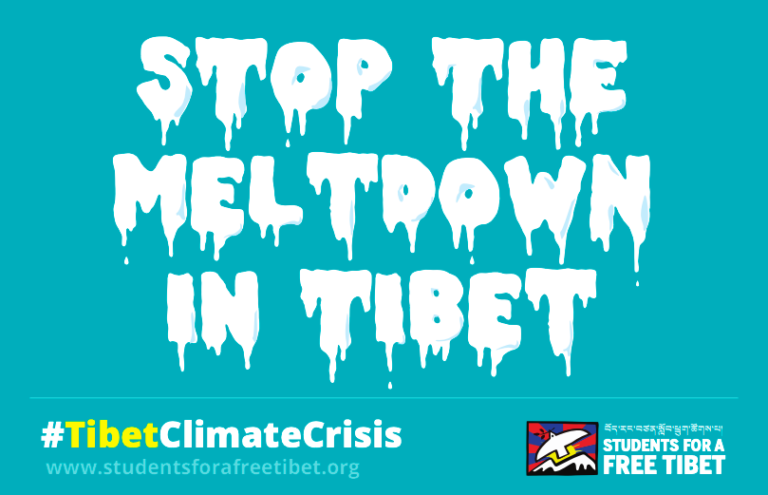Contacts:
Pema Doma, USA Grassroots Coordinator – NYC [English]
E: pemadoma@studentsforafreetibet.org
T: +1 6177923606
Sonamtso, Campaigns and Communications Director – San Francisco [English]
E: sonamtso@studentsforafreetibet.org
T: +1 5108160600
Rinzin Choedon, India National Director – Dharamsala [Tibetan, Hindi]
E: rinchoe@studentsforafreetibet.org
T: +91 7833916075
Sonam Chokey, Canada National Director – Toronto [English, Tibetan]
E: sonam@studentsforafreetibet.org
T: +1 6477091545
In the six decades since its violent occupation by China in 1959, Tibet has garnered attention as a human rights cause; but, a highly overlooked aspect of Tibet is its role in the climate conversation.
For thousands of years, the people of Tibet have protected the environment and water reserves through responsible nomadic and agricultural lifestyles. However, China’s occupation and exploitation of the land has created a climate crisis in Tibet. Climate change affects Tibet at a greater margin than nearly any region in the world. Tibet is warming at a rate up to three times faster than the global average, resulting in accelerated glacial melting and significant impacts on river flow. China directly benefits from exploiting Tibet’s rivers though extensive damming for hydropower, but continued environmental degradation and conscious destruction will result in irreversible damage.
Known as the “Third Pole”, Tibet holds the largest reserve of glacial freshwater outside of the North and South Pole. The ongoing damming projects funded by Chinese government backed companies have resulted in the drastic shift of the mineral composition of rivers, wreaking havoc on animal and plant ecosystems, and the jeopardization of safety with increased earthquake vulnerability. Damming has resulted in the forced relocation of countless Tibetans and grave uncertainty for the nearly two billion people downstream who rely on Tibet’s rivers.
While China’s exploitation of Tibet’s environment continues, Tibetans remain as one of the most important yet under-acknowledged and marginalized frontline communities in conversations about climate change and justice. The current climate crisis in Tibet is the result of decades of extractive colonialism and corporate greed that have infringed on the rights of the Tibetan people.
At Students for a Free Tibet (SFT), we remain committed to our vision, in which we “aim to inspire and enable people, especially youth, to create a just and equitable world, free of oppression, in which there is respect for the earth and all living things.” To do this, we feel that it is absolutely essential to engage in intersectional spaces with other like-minded frontline communities.
We believe that all frontline communities, including the people of Tibet, have a basic right to hold agency over the decisions that impact their homeland. Tibetans have nurtured, defended, and protected the land and water for millennia. We honor this ongoing stewardship and call on people around the world to join us in our demand for the protection and restoration of Tibet’s environment, and the immediate end to nomad displacement and mining of sacred Tibetan lands.

